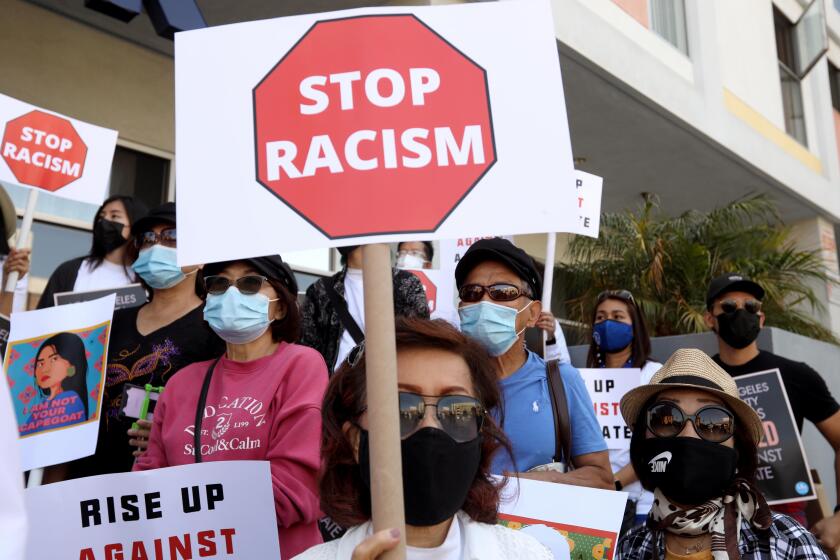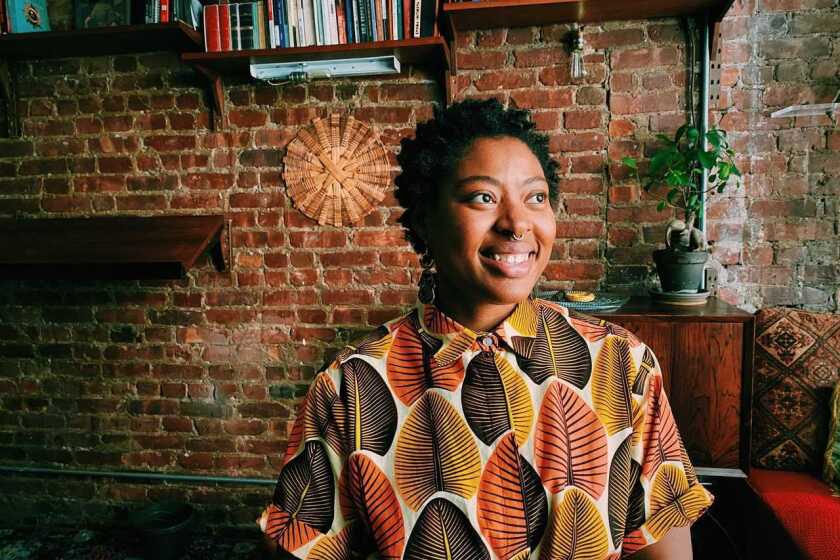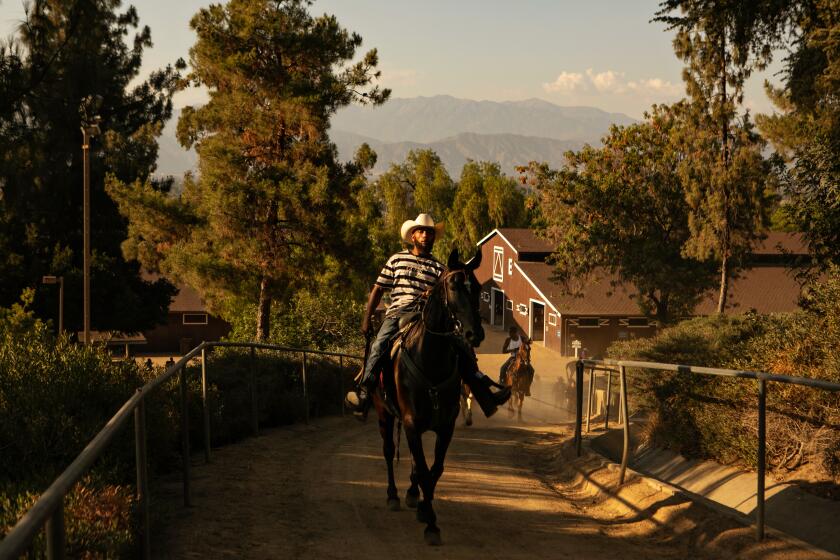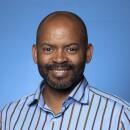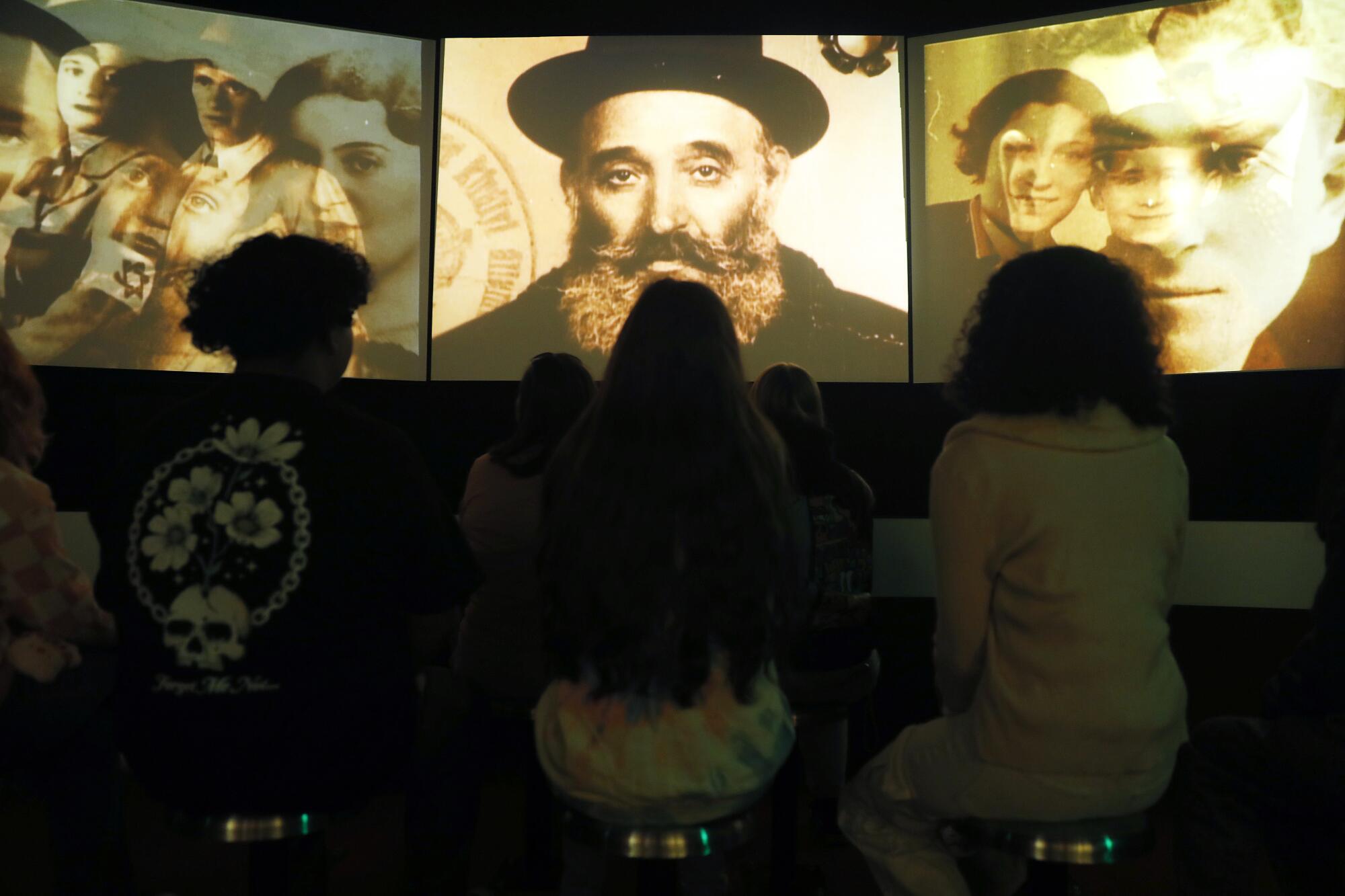
The Museum of Tolerance pierces your heart from the moment you step inside.
Portraits of Holocaust survivors line a spiral walkway down to an exhibit immersing you in a world of grief.
In a series of small rooms with dim theatrical lighting, human-scale dioramas, brought to life with voiceover narration, depict the rise of antisemitism in Nazi Germany and the systematic murder of 6 million Jews during World War II.
“My wish is that the world will learn that hatred is evil and only tolerance and love can bring peace on earth,” reads the sentiment under the picture of Esther Stuhl, who survived the persecution of Jews in Krakow, Poland.
Stuhl’s plea for humans to reach for the best in themselves is hard to digest when outside this museum on the streets of Los Angeles, across California and around the nation, it is hate, not love, that so often rules the day.
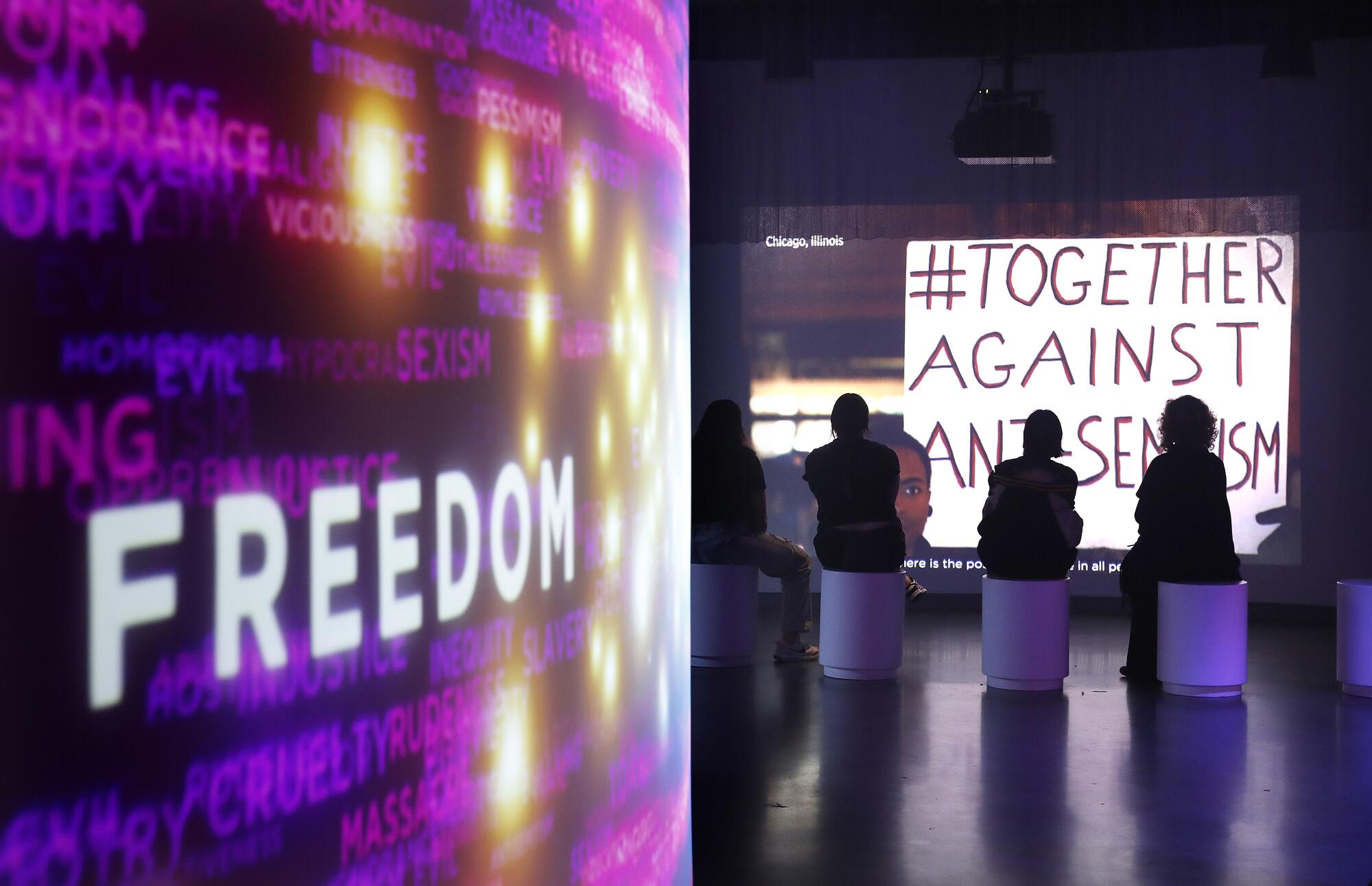
I’ve come to this museum, and roamed its leafy neighborhood of one-story homes and mom-and-pop businesses, feeling unnerved that age-old prejudices have found legions of adherents in our time.
Anti-Jewish incidents hit a record high in U.S. and California in 2022, the Anti-Defamation League says. Some harassers referenced Ye’s antisemitic remarks.
Two shootings in February that targeted Jewish residents in the Pico-Robertson neighborhood — both victims survived — only deepened my alarm.
I didn’t want to wait until the next act of violence against Jews to happen here — or for yet another hate-fueled massacre elsewhere — to be reminded of the yearning for acceptance that binds those who’ve historically endured discrimination and violence because of who they are.
As Rabbi Abraham Cooper, associate dean of the Simon Wiesenthal Center, the human rights organization that operates the museum, says: “The time to roll up our sleeves is not during crisis. It’s when things are quiet.”
But with Americans starkly divided along cultural fault lines — religious hatred, racism and hostility toward the LGBTQ community abound — and with many reluctant to talk about the nation’s legacy of injustice, do we have it in us to embrace one another’s humanity?
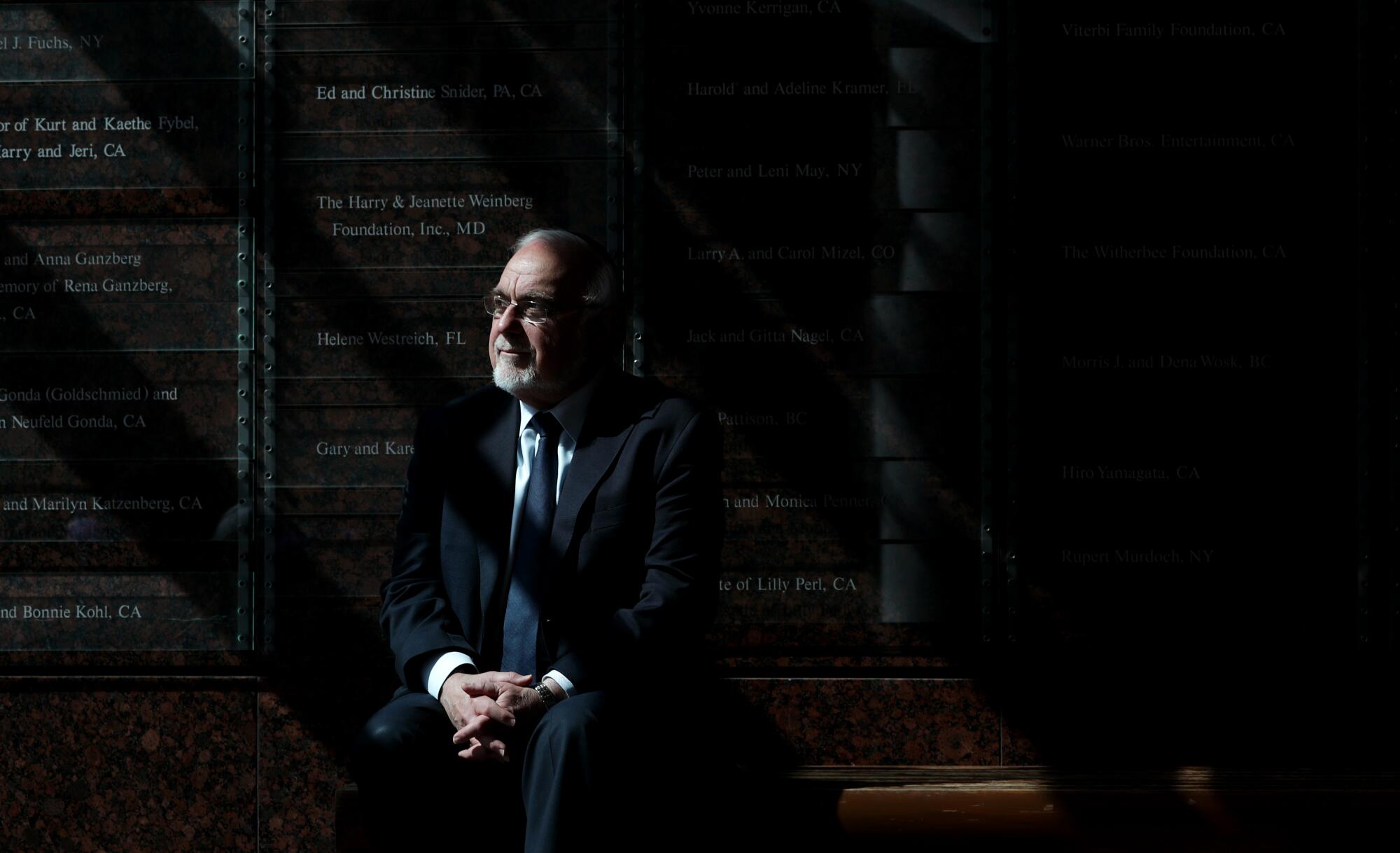
Guides usher groups through the museum’s sometimes eerie exhibits to give them context for what they’re seeing and hearing.
At the end of a recent tour, Rabbi Yoshi Zimmerman tries to achieve a breakthrough with high school students who sit cross-legged and stone-faced on the floor. The group is a lot like L.A., a mix of races.
They’ve just spent time in the grimmest section of the Holocaust exhibit, where they had to file through brick tunnels into a stark, windowless room that evokes a gas chamber.
The 32-year-old rabbi tells them they should not think of the repression of Jews as all in the past.
Zimmerman asks them to consider the antisemitic online tirades by the rapper Kanye West, now known as Ye. He has been blocked from Twitter, but Ye continues to have more followers on Instagram, 18 million, than the population of Jews in the entire world, about 15 million.
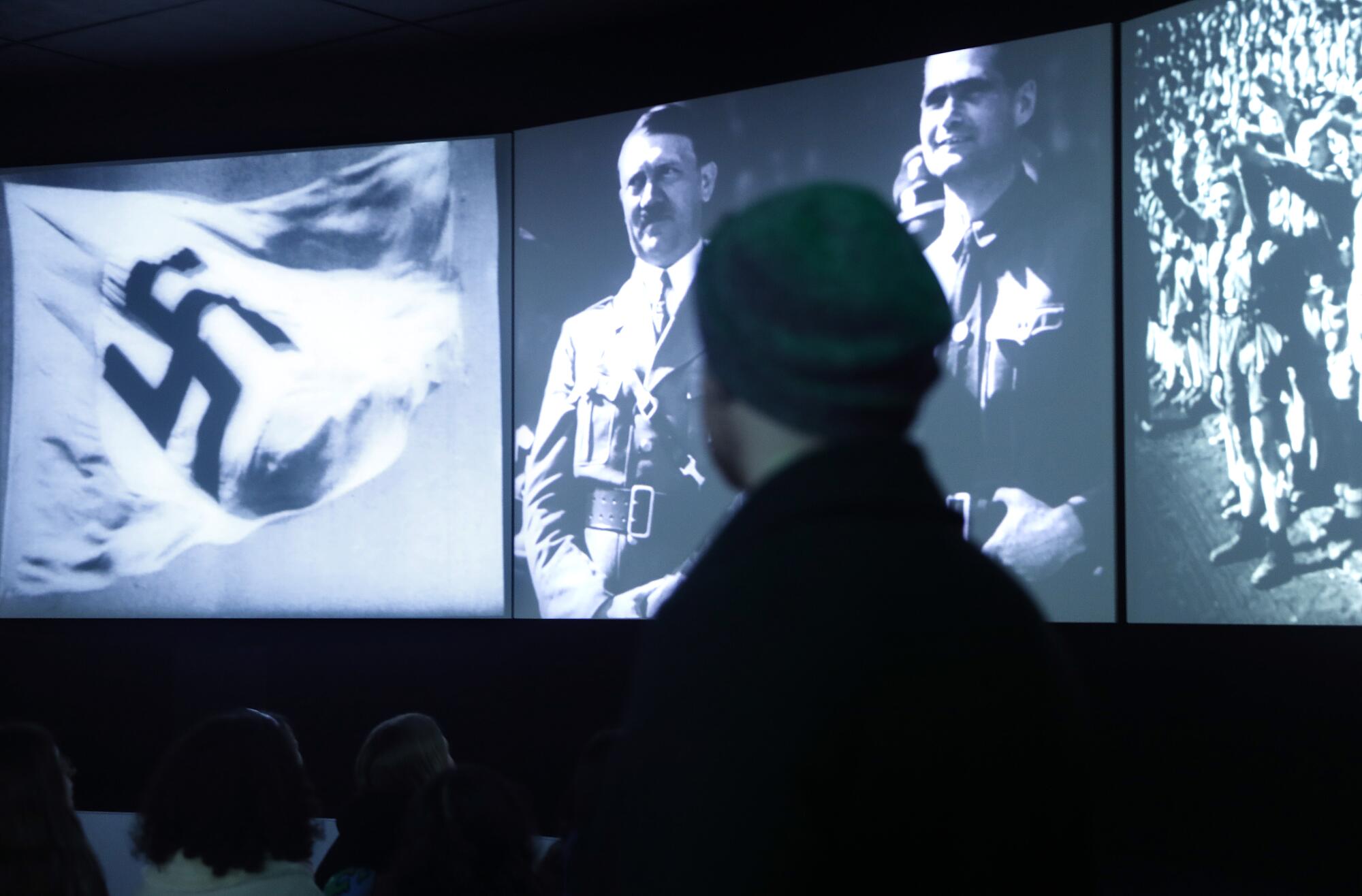
His fan base remains strong despite his threat to go “death con 3 On JEWISH PEOPLE,” one of several posts he eventually apologized for.
Los Angeles police figures show a 13% increase in the number of hate crimes, with the biggest jump seen in crimes against Black people.
Zimmerman moves on to other present-day events.
“When was the last time that someone came into a synagogue and shot it up and killed people? Two weeks ago,” Zimmerman says. “The last time a country closed its doors to Jews so that Jews were not allowed to live there — when was that? Two years ago …
“It’s the same rhetoric, the same sentiments, the same ideas.”
The group remains silent. It’s a lot to take in. Even for someone who arrived already knowing plenty about the Holocaust, the exhibit can feel overwhelming.
Zimmerman plows ahead.
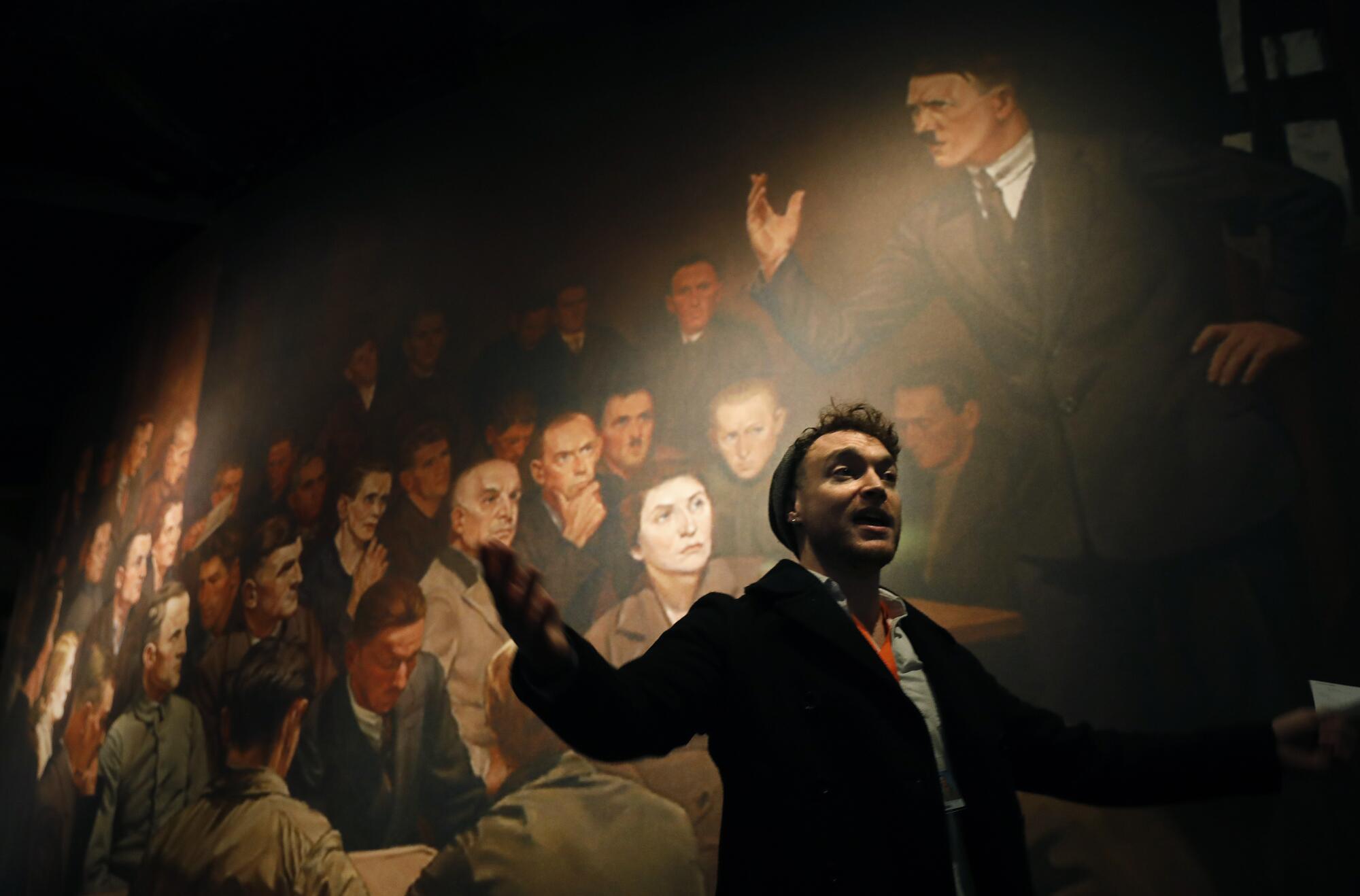
“What stops it from happening this time?” he says, then answers his own question. “The world you want to create, the world you want to live in, no one is going to make it but you.”
California archaeologist Ayana Omilade Flewellen sees the war on AP Black studies and other teachings as a sign that America isn’t ready to confront injustice.
Many students voice sympathy for what happened to Jews in Nazi Germany. But some days are like this one — stunned faces and awkward silences.
Sometimes, all he gets is shrugs.
And then there are the students who tell him they feel no moral responsibility to denounce bias crimes against Jews, which is all the more disheartening given that these incidents hit record levels nationwide in 2022, according to a new report by the Anti-Defamation League.
“I’d say 90% of the kids have not met a Jew at all,” Zimmerman says. “You’d be surprised at how many say, ‘It doesn’t affect me. It’s not my people. I don’t care.’ ”
In those moments, Zimmerman tries to turn the table on his audience: “If they came and said, ‘We’re going to kill and deport your family,’ would you hope that I would care?”
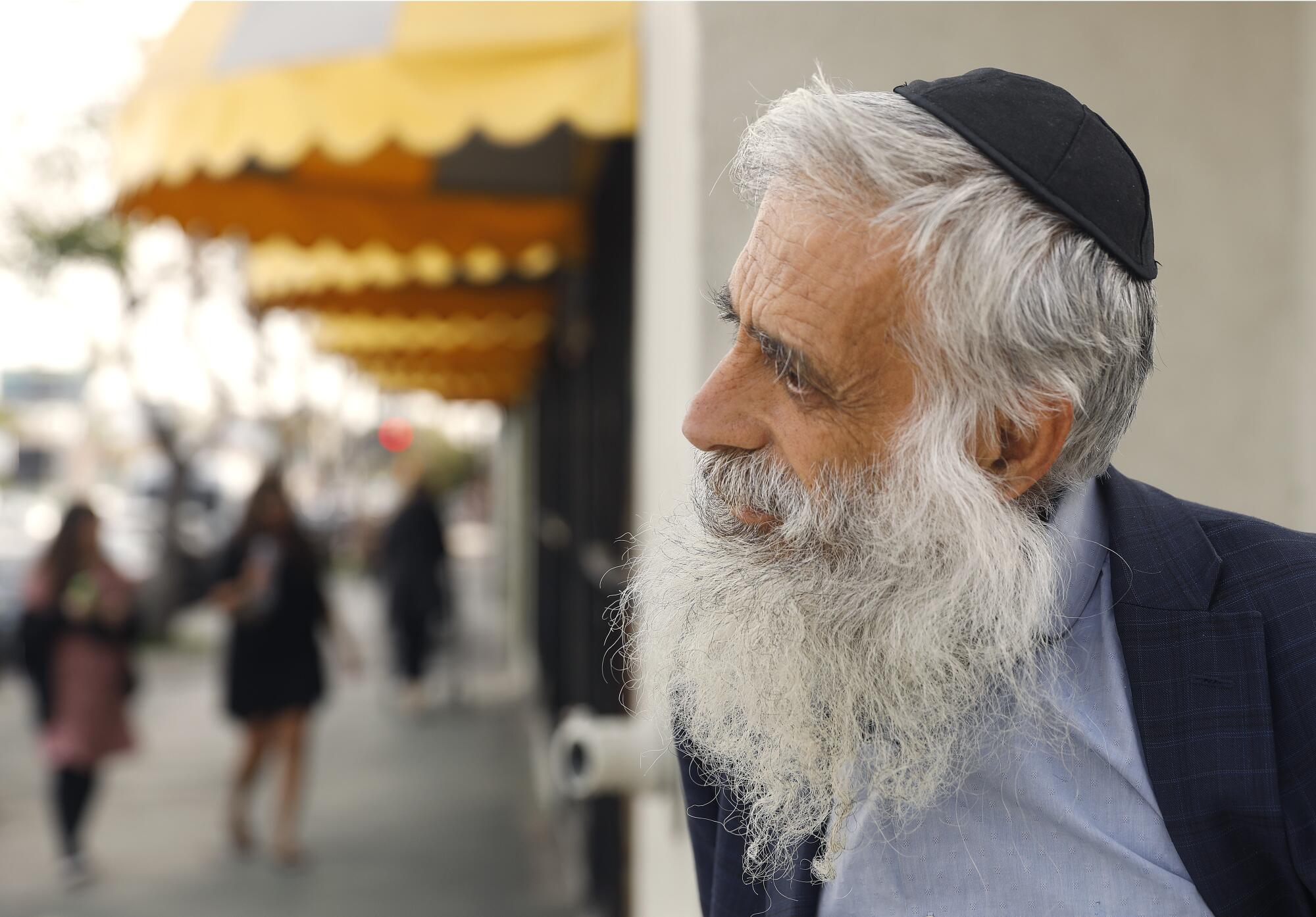
The reverse-psychology tactic works, but only occasionally, Zimmerman says.
For Cooper, 72, tolerance is more of an aspiration — a work that is perpetually in progress rather than a fact of life.
It’s a challenge to travel the globe preaching about compassion alongside presidents, popes and civic leaders when the voices of hate and resentment reverberate so forcefully in the unguarded echo canyons of people’s online lives — and in real life closer to home in L.A.
In October, demonstrators hung a banner from a 405 Freeway overpass that read, “Kanye is right about the Jews” and raised their arms in the Nazi salute.
Cooper arrived in L.A. in 1977 with dreams of making the world safer for his people — and for all people. He joined Wiesenthal Center CEO and President Rabbi Marvin Hier to help found the center alongside its namesake. Wiesenthal, the late Ukraine-born architect, Holocaust survivor and Nazi hunter, with his wife lost 89 family members to Hitler’s crusade against Jews.
“One time he was asked at a university in Ohio in 1980, ‘Were you surprised at how many Nazis there were?’” Cooper recalls of his friend Wiesenthal. “He said, ‘No. I was only surprised by how few anti-Nazis there were.’”
That’s the unnerving thing about the recent spike in hate crimes. In times of peril, it can be hard to know who has your back.
The Pico-Robertson neighborhood occupies a part of L.A. that’s a checkerboard of enclaves rather than a true melting pot — among them Ethiopian, Persian and LGBTQ. Crossing paths with someone who doesn’t look like you, trust you, worship the same God or understand your story is almost inevitable.
“All the photos and everything else we have as evidence and people still say it didn’t happen. That’s just being naive — or maybe they don’t want to know the truth.”
— Debbie Markowitz Ullman, owner of Factor’s Famous Deli
On traffic-clogged La Cienega and Robertson boulevards, drivers speed through green lights past weed dispensaries, carwashes and Orthodox Jewish men leaving synagogue in their black suits, white button-downs and wide-brimmed hats.
At Sideshow Bookstore on La Cienega, the cramped aisles are piled high with volumes on Judaism and every genre of literature and nonfiction. A portrait of Martin Luther King Jr. watches over owner Tony Jacobs, who greets customers with an offer of free espresso.
“It feels like we’re living in a climate from 100 years ago,” says Jacobs, 62, who considers himself a secular Jew. It scares him — the way a baseless conspiracy theory or online rant can metastasize and cause so much harm.
He worries that many Americans have given up on learning about people whose lives are different from their own.
Even so, pockets of hope and trust endure. Down a nearby side street, two Jewish boys, ages 8 and 10, sell homemade cookies and shout “Free lemonade!” to all who pass their block of midcentury cottages fronted by lush gardens.
On the porch of one of the boys’ homes, his mother explains why she’s comfortable allowing the kids to set up their stand not far from where the shootings in February happened. Her willingness to talk is remarkable given that I’m a Black man in a neighborhood with few who look like me.
Children need to be taught to be vigilant, she says, but they also need to be free to enjoy being young. She refuses to allow the haters to change the way her family lives.
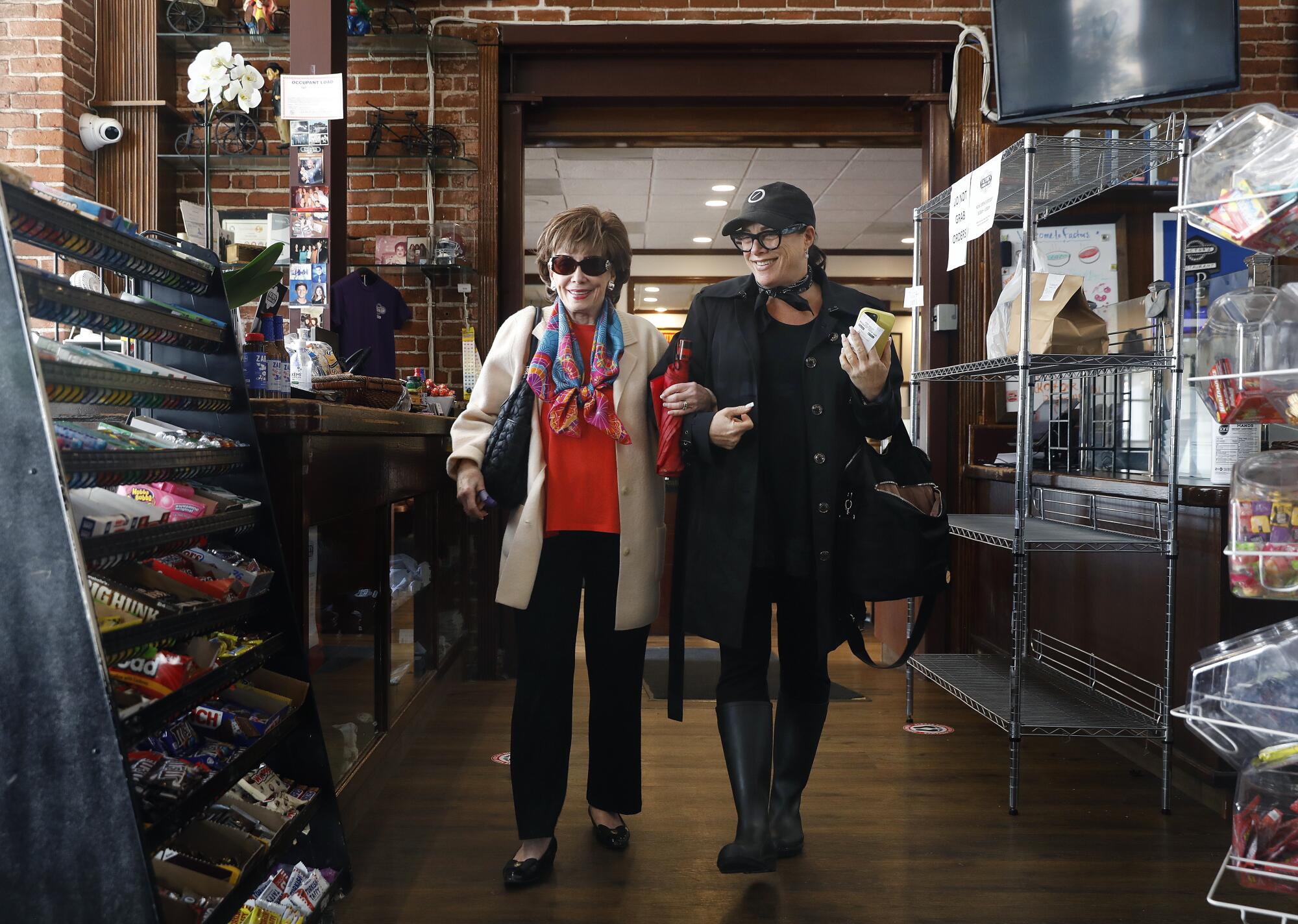
At Factor’s, a Jewish deli on Pico that’s been in business for 75 years, neighborhood regulars and patrons from other parts of the city fill booths in the mirrored dining room. They chat and laugh while enjoying matzo ball soup, latkes and towers of slow-roasted pastrami on rye bread.
And yet, for some of those who are Jewish, it’s hard to carry on business as usual in these uneasy times.
One woman who lives nearby explains that she stopped wearing her Star of David pendant to make herself less conspicuous. The woman sitting next to her says she’s so fearful of an antisemitic attack that she won’t walk through the area alone.
What tears at the restaurant’s co-owner, Debbie Markowitz Ullman, is that many Americans believe the Holocaust was made up.
“All the photos and everything else we have as evidence and people still say it didn’t happen,” says Ullman, 60, who also lives in the neighborhood. “That’s just being naive — or maybe they don’t want to know the truth.”
A framed portrait of her mother, Lili Markowitz, hangs at the back of the restaurant. Markowitz, who died in 2020 at age 94, survived the Holocaust, as did her late husband Herman Markowitz. But her younger sister, younger brother and father perished in the Auschwitz concentration camp.
“Being the daughter of a Holocaust survivor, what my mother went through, this is not anything close to how bad that was, so I just feel like we’ve always had some antisemitism around,” Ullman says.
“We actually get a lot of groups of students coming here after the Holocaust museum and my mother actually used to speak to them,” Ullman says. She feels an obligation to continue sharing her family’s story with customers who are willing to listen.
“They appreciate the history, knowing where the Jewish people came from in general and what they went through ...” she says. “We have the same prejudices against us as many others — as African Americans, as Asians, as all people who feel [discriminated against].”
Ullman has a daughter and son, 24 and 21. They grew up in a family that faithfully celebrated Jewish holidays, observed the Sabbath time of rest and took pride in the heritage of their people. At the same time, she instilled in her children that every human being deserves to be respected. It’s a common sense lesson — written in the Scriptures, reinforced by elders the world over and recited by Ullman to her children their whole lives: Do unto others as you would have them do unto you.
‘In these spaces, it’s safe to be us’: California’s Black trail riders, rodeo stars and ranchers find fellowship and spiritual freedom in rural traditions.
“It doesn’t matter if someone is Jewish or not Jewish, they should be treated the same — I’m all about equal respect, absolutely,” she says. “There are simple things you can do to make people feel good that don’t cost you anything but a second of time.”
Cooper, the Wiesenthal Center’s associate dean, has no illusions about how hard it will be to persuade the most recalcitrant troublemakers to embrace this spirit of mutual understanding. The best he can hope for, he says, is that the Museum of Tolerance will change one mind at a time.
One section of the museum is dedicated to nonviolent movements for justice involving other oppressed people, including Black Americans, to draw a link between the Jewish fight for acceptance and the broader struggle for justice.
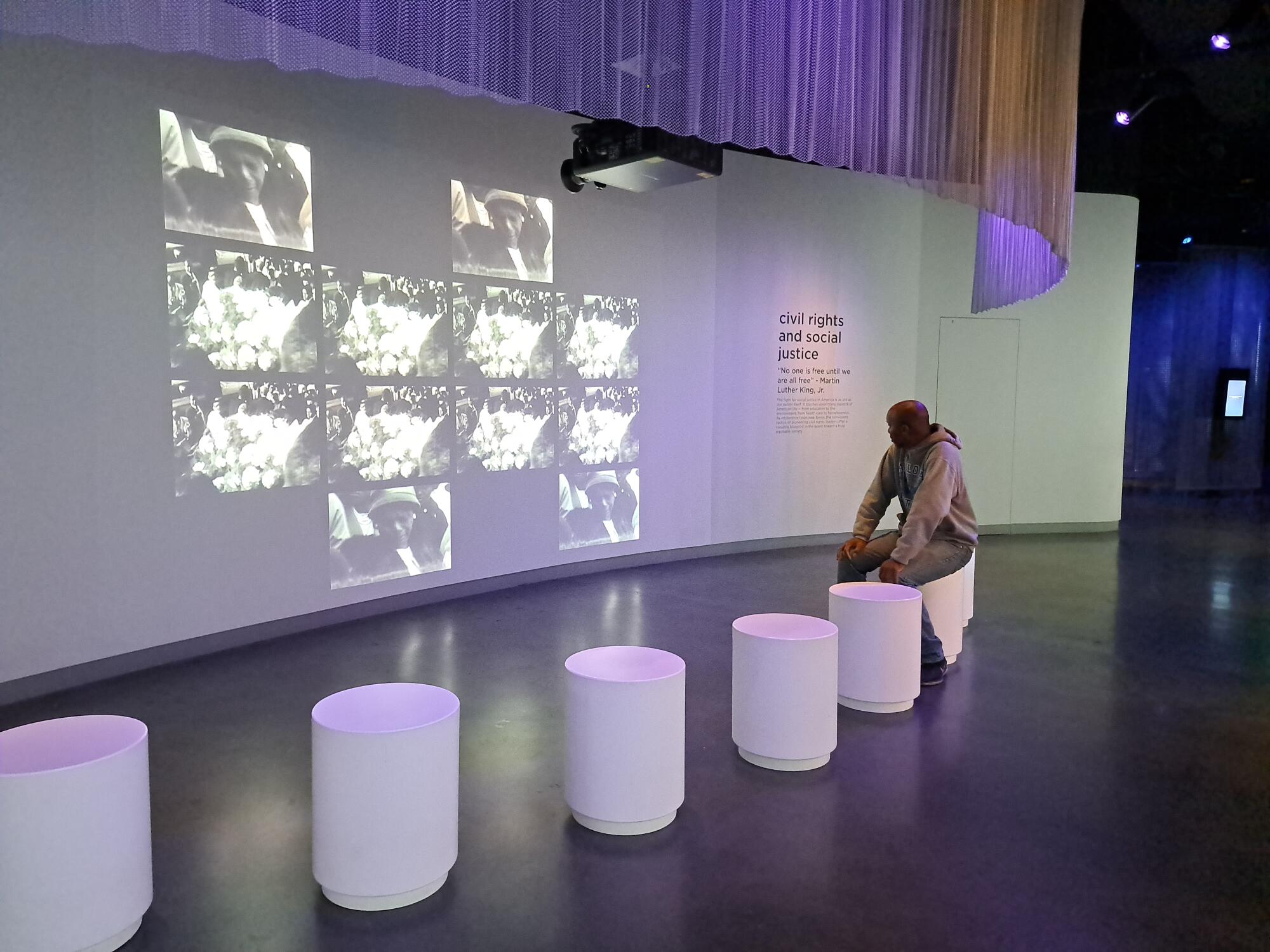
That’s where I spot Maynard Fuggent one day. I’m so gratified to see a fellow Black American taking in the lessons of another people’s yearning to live freely in this world that I approach to say hello.
Fuggent, a fiction writer whose family migrated to California from the South, made a special trip from his home an hour away in Riverside. One reason he came was to remind himself that “there is more than just the conflicts between us.”
When the 63-year-old reflects on the fact that Jewish people have survived thousands of years of persecution, and thrived despite the atrocities inflicted upon them in modern times, he can’t help but be awed by their perseverance.
“There is this essence of life that is stronger than the circumstances we’re in,” he says. “To be in a state of elimination, and yet you come through it somehow. ... These are the heroes that I aspire to be.”
Fuggent sits on a stool and loses himself in quiet contemplation. Video projections on the wall illuminate him as he listens to King’s stirring voice and the sound of Black gospel choirs singing about my people’s particular tribulations — and the universal will to overcome.
More to Read
Sign up for Essential California
The most important California stories and recommendations in your inbox every morning.
You may occasionally receive promotional content from the Los Angeles Times.

